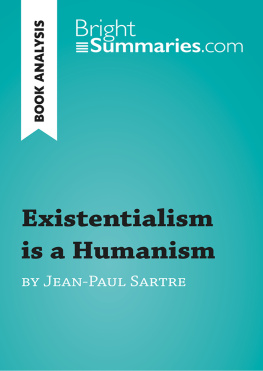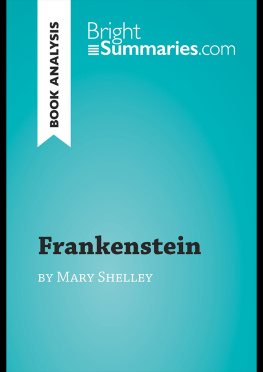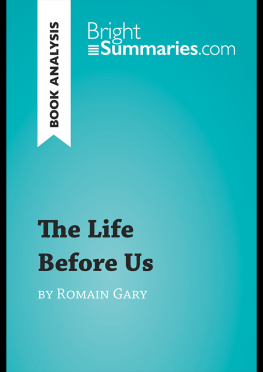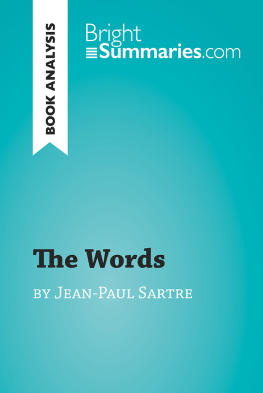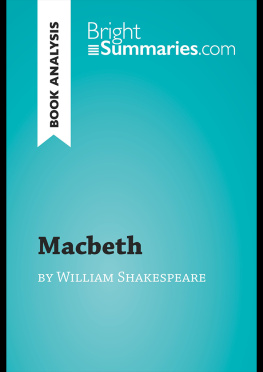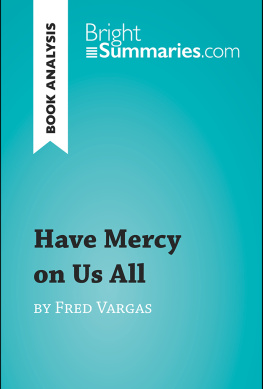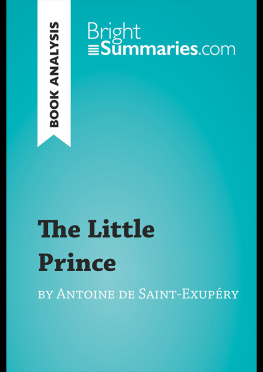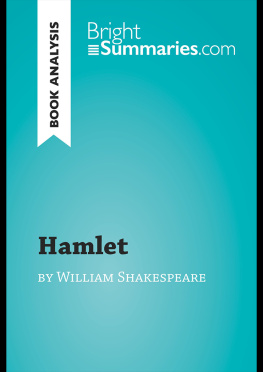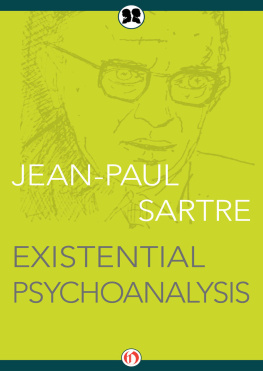Bright Summaries. - Existentialism is a Humanism by Jean-Paul Sartre (Reading Guide): Complete Summary and Book Analysis
Here you can read online Bright Summaries. - Existentialism is a Humanism by Jean-Paul Sartre (Reading Guide): Complete Summary and Book Analysis full text of the book (entire story) in english for free. Download pdf and epub, get meaning, cover and reviews about this ebook. year: 2016, publisher: Primento Digital, genre: Science. Description of the work, (preface) as well as reviews are available. Best literature library LitArk.com created for fans of good reading and offers a wide selection of genres:
Romance novel
Science fiction
Adventure
Detective
Science
History
Home and family
Prose
Art
Politics
Computer
Non-fiction
Religion
Business
Children
Humor
Choose a favorite category and find really read worthwhile books. Enjoy immersion in the world of imagination, feel the emotions of the characters or learn something new for yourself, make an fascinating discovery.
- Book:Existentialism is a Humanism by Jean-Paul Sartre (Reading Guide): Complete Summary and Book Analysis
- Author:
- Publisher:Primento Digital
- Genre:
- Year:2016
- Rating:5 / 5
- Favourites:Add to favourites
- Your mark:
- 100
- 1
- 2
- 3
- 4
- 5
Existentialism is a Humanism by Jean-Paul Sartre (Reading Guide): Complete Summary and Book Analysis: summary, description and annotation
We offer to read an annotation, description, summary or preface (depends on what the author of the book "Existentialism is a Humanism by Jean-Paul Sartre (Reading Guide): Complete Summary and Book Analysis" wrote himself). If you haven't found the necessary information about the book — write in the comments, we will try to find it.
Bright Summaries.: author's other books
Who wrote Existentialism is a Humanism by Jean-Paul Sartre (Reading Guide): Complete Summary and Book Analysis? Find out the surname, the name of the author of the book and a list of all author's works by series.
Existentialism is a Humanism by Jean-Paul Sartre (Reading Guide): Complete Summary and Book Analysis — read online for free the complete book (whole text) full work
Below is the text of the book, divided by pages. System saving the place of the last page read, allows you to conveniently read the book "Existentialism is a Humanism by Jean-Paul Sartre (Reading Guide): Complete Summary and Book Analysis" online for free, without having to search again every time where you left off. Put a bookmark, and you can go to the page where you finished reading at any time.
Font size:
Interval:
Bookmark:
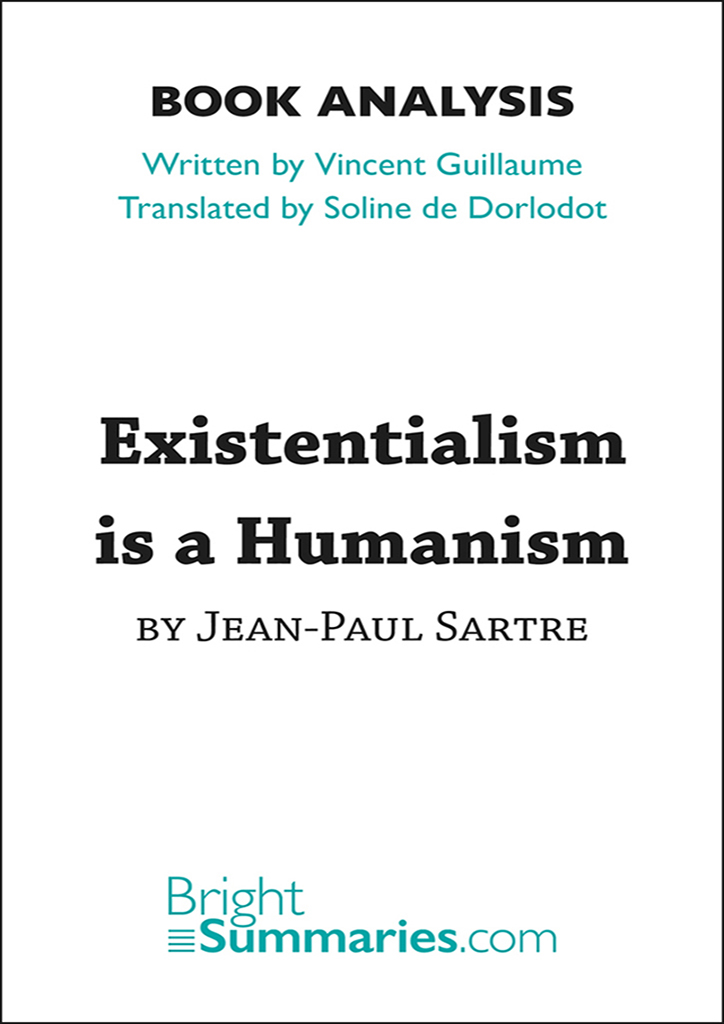

Born in 1905 in Paris
Died in 1980 in Paris
Other works:
Nausea (1938), a novel
No Exit (1944), a play
Existentialism is a Humanism (1946), a philosophical essay
Jean Paul Sartre is a French writer and philosopher who was born in 1905 in Paris and died in 1980. Both incensed and dismissed for his existentialist philosophy, he wrote several essays such as Being and Nothingness (1943) or Existentialism is a Humanism (1946). He also wrote numerous literary texts in which he strongly illustrates his philosophy and his definition of literature: Nausea, a novel published in 1943, The Flies, a play published in 1943, or No Exit, published in 1944. In 1964, he declined the Nobel Prize for literature and publishes The Words, an autobiographical retelling of his youth. Known also for being the companion of Simone de Beauvoir (French writer, 1908-1986), Sartre is remembered as much for his activity as a writer as for his extreme left political engagement.
Genre: essay
stedition: 1946
Themes: philosophy, freedom, responsibility, engagement, atheism
Existentialism is a Humanism (1946) is the slightly edited transcription of a lecture which Sartre gave in 1945 for the Maintenant Club, which was created during the Liberation. This lecture achieved an immense success, proof of Sartres fame which did not prevent the philosopher from being often misunderstood, hence his desire to express himself.
Sartre explains his philosophy in a clear way, answers the criticism that his philosophical doctrine sparked, represents mankind in its total freedom and responsibility, and demonstrates that, far from being pessimistic, existentialism favors action and commitment.
Sartre exposes the main criticisms associated with existentialism:
According to the communists, it is a bourgeois philosophy of the impossible action;
According to the Catholics, it a form of pessimism which denies the importance of human efforts by suppressing divine values.
All reproach existentialism for lacking in human solidarity by suggesting a subjectivism which isolates the individual. As a whole, people think existentialism to be sad and ugly, even though their wisdom of the people (p. 1) seems equally depressing to Sartre.
For atheist existentialism, existence precedes essence. Until then, philosophers promoted the idea that man was determined by human nature, just like a manufactured object whose existence predates its essence (its usefulness, its method of production and everything that allows to define it predates and conditions its fabrication). However, for Sartre, man first of all exists, encounters himself, surges up in the world and defines himself (p. 3): Therefore, there is no such thing as a human nature, as Man becomes what he does, or what he wants.
Man is seen as a project. He is responsible for himself, which existentialism aims to make him aware of. This philosophy is based on the idea of a double subjectivity, both individual and human: by choosing and acting individually in order to become what one wants to be, one turns oneself into a project which one deems valid for everybody else, because what one considers as the right choice for oneself reflects the image of Man as one thinks it should be. The awareness of such a responsibility towards oneself and towards others provokes anxiety when man has to make a choice yet does not know which values to use as a reference.
Confronted by the non-existence of God, Man is in a position of abandonment (an existentialist notion that goes hand in hand with anguish). This has consequences: that which is good is written nowhere, nor can it be discovered a priori. Man is therefore left on his own and condemned to be free (p. 5): he is entirely responsible, both for his passions and his interpretation of the world. Placed before a choice as drastic as that of the student torn between his wish to stay at his mothers side and his desire to leave her to her grief to join the resistance in order to avenge his brother and help his country, one has to decide between two kinds of morality:
The immediate and individual help;
Action on a larger scale, which is more ambiguous (the role he might play could be either insignificant or important in terms of impact).
No fixed doctrine can solve that dilemma. Choosing according to ones feelings is also illusory, because deciding that one finally gives more value to the mother than to the country can only be verified by the actual fact of remaining by her side, and not by considering doing so. Sartre explains that I can only estimate the strength of this affection if I have performed an action by which it is defined and ratified. But if I then appeal to this affection to justify my action, I find myself drawn into a vicious circle (p. 6). Similarly, choosing someone to ask for advice is already deciding the answer one wishes to hear.
To act, man must restrict himself to taking into account the probabilities that directly concern his action and make it possible. For example, choosing to join the Marxist fight implies betting, among other things, on the fact that the party will remain thoroughly unified and that the comrades will be ready to stay committed until the end. Yet this could not be the case, because they are free. However, the probability that an international party will stay united or not should not be taken into account when making the choice, because it does not depend on the will of the person who joins it.
Consequently, one needs to act without hope, to not entertain illusions, yet not renounce either, and do everything one can: existentialism is a philosophy of commitment. The criticisms made by quietism (a trend that favors contemplation over action) are therefore unjustified: on the contrary, existentialism considers that man can only exist through his actions, that he is nothing apart from them. To justify ones lost dreams by thinking that one had the potential to accomplish them but that the circumstances were not favorable is therefore refused. The protagonists of Sartres novels are horrible not only because they are depicted as being cowardly and mean, but mainly because they are guilty of being that way through their actions and the choices they made. People prefer the deterministic thought, according to which one is born or made a hero or a coward, because it removes their responsibility.
Although there is no such thing as a human nature, Man nevertheless possesses a universality (being in the world, being mortal, being free, etc.) that is called his condition, and that defines him both objectively - because it is universal and subjectively because this universality is nothing unless Man determines himself in relation to it. Man also determines himself in relation to the universality of the human condition in situations, i.e. in a specific sociohistorical context. He does so though a multitude of projects that are individual, but never entirely foreign, because they are always based on the same universal characteristics of Man, including freedom (which enables one to define oneself through choices). Choosing is an absolute, an element of the human condition, and each choice will therefore be understandable to anybody at any given time period, yet without losing its relativity due to the actual situation in which the choice has been made.
Font size:
Interval:
Bookmark:
Similar books «Existentialism is a Humanism by Jean-Paul Sartre (Reading Guide): Complete Summary and Book Analysis»
Look at similar books to Existentialism is a Humanism by Jean-Paul Sartre (Reading Guide): Complete Summary and Book Analysis. We have selected literature similar in name and meaning in the hope of providing readers with more options to find new, interesting, not yet read works.
Discussion, reviews of the book Existentialism is a Humanism by Jean-Paul Sartre (Reading Guide): Complete Summary and Book Analysis and just readers' own opinions. Leave your comments, write what you think about the work, its meaning or the main characters. Specify what exactly you liked and what you didn't like, and why you think so.

